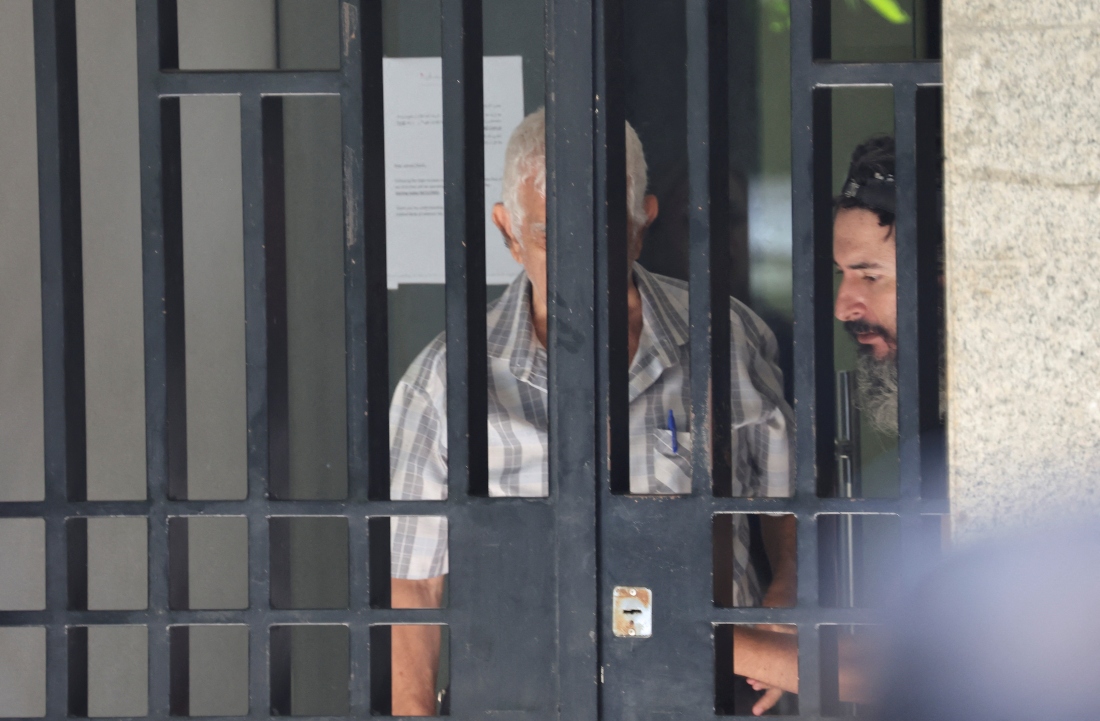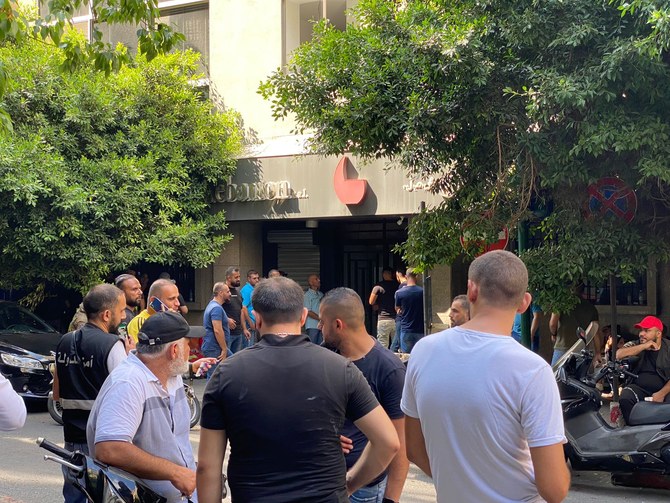Bystanders praised an armed man who held bank staff hostage for hours on Thursday in Beirut because he could not access funds frozen at the bank after the country’s economic collapse.
The hostage situation in a bank in Lebanon’s capital ended after authorities agreed to grant the gunman partial access to his frozen funds in exchange for releasing all the hostages.
The man — 42-year-old Bassam Al-Sheikh Hussein — surrendered to security forces when the bank agreed to give him $30,000 out of his more than $200,000 in trapped savings.
A citizen is detaining citizens and employees at gunpoint in a bank in #Hamra Street... and the army is surrounds the place!#Lebanon #Beirut pic.twitter.com/vxudP6zgF0
— خالد اسكيف (@khalediskef) August 11, 2022
Al-Sheikh Hussein earlier took more than eight employees hostage at Federal Bank in Hamra, Beirut.
He poured gasoline on the floor and pointed a shotgun at employees, demanding the bank let him withdraw $2,000 from his frozen accounts, in accordance with the central bank circulars to all banks in 2019.
Soldiers and officers from the Internal Security Forces surrounded the bank, which is situated on one of the busiest streets leading to the American University of Beirut and its medical center.
Negotiations began between the gunman and the bank’s management, first led by Hassan Mughnieh, the head of Lebanon’s Depositors Association.
They were later joined by the ISF’s information branch in the negotiations.
Caretaker Minister of Interior Bassam Mawlawi’s media office announced that he was following up the negotiations between the information branch and the Federal Bank from the ISF’s operations rooms.
Footage of Al-Sheikh Hussein first appeared on social media platforms, with the gunman shouting demands for his money to be released.

He told bank employees he wanted money to pay for medical bills for his father, who was receiving treatment in a hospital.
One of the bank employees filmed the scene, when the gunman could be seen carrying a gun.
The man entered the bank around 11 a.m. and asked the bank’s customers to leave while keeping the employees and the bank’s branch manager Hassan Halawi inside the building.
Two customers remained inside by accident, while one employee managed to evade capture as he was on duty outside the bank. The employee told Arab News that he was surprised to see the army and ISF surrounding the bank upon his return.
One of the customers taken hostage was released by the gunman, and handed to the Red Cross who were waiting for him, while the other insisted on staying inside “in solidarity with the armed man.”
Hasan Moghnieh, head of the depositors association, who led the negotiations with the armed depositor, told Arab News that he was negotiating with him from behind the metal bars of the bank’s closed gate.
Moghnieh said the armed man seemed calm and was assured by the security agencies that he would not be harmed.
“He is sitting in a chair, and I do not know how he dares to smoke a cigarette near the gasoline,” he added.
Moghnieh added that the gunman initially demanded to withdraw $2,000 to pay for his father’s medical bills at the Al-Zahraa hospitall, but when this was initially refused he demanded the entire $210,000 balance of his account.
On further conversation with the bank's manager, Moghnieh said the gunman was offered $10,000. However, the armed depositor rejected the offer, demanding his entire balance.
Lebanon : Armed man takes hostages to free his money#Lebanon #لبنان pic.twitter.com/mBuMNWp9N3
— Hashtag Elyoum (@Hashtagelyoum) August 11, 2022
“I do not know the armed man in person. However, while negotiating with him, his threats seemed serious as he told me that he will throw the bank manager out of the window. He did not harm the detainees,” Moghnieh added.
Curious onlookers first gathered near the bank, then were joined by the concerned families of the bank employees.
They were later joined by Al-Sheikh Hussein’s family in Beirut, who began negotiating a settlement for him.
Moghnieh said: “The family wants a written undertaking that the ISF would not assault their son, and that they are ready to lower the demand and deduct a decent amount from the deposit.”
He said the bank first suggested $10,000, and when the armed man insisted on withdrawing his entire deposit, there was no more contact between the bank manager and the central management.
#Breaking
The scene at Federal Bank in Hamra, Beirut, where a man has taken a group of employees & others hostage, demanding his money.Lebanon’s commercial banks imposed informal capital controls in 2019, preventing depositors from withdrawing the full dollar value of savings. pic.twitter.com/9ort1YAT3N
— Nada Homsi (@No_Homsi) August 11, 2022
Other people, including customers of the bank chanting their support for the armed man: “Down with the rule of the banks,” one of the slogans of 2019’s mass protests.
Activist lawyer Haytham Azzo told Arab News: “We are following up on the events and we had warned that this would be one of the unjust banking procedures’ implications. As lawyers, we are ready to defend Al-Sheikh Hassan for free.”
Azzo said the banks had compromised national security, which was proven by “what we are seeing today.”
He added: “We called for people to be able to withdraw deposits when necessary, and the banks refused.”
The head of the Federation of Syndicates of Banks Employees in Lebanon, George Al-Hajj, earlier said they wanted the incident to end peacefully.
“We will not resort to a strike because it would be useless.”
A statement from the Depositors Association held the bank owners, government, parliament and the central bank responsible for Thursday’s developments.
The association said “the extortion of depositors and theft of their life savings will lead to further unpredictable responses.”
The association held the judicial authorities responsible for any violence on the streets or in the face of banks, due to its determination to protect the “unjust and aggressor against the oppressed depositor.”
The tense situation in Beirut occurred after Lebanese banks resumed work on Wednesday, following a strike last Monday, in protest against the judiciary’s treatment of banks, in light of the depositors’ proceedings against them.
In a general assembly on Wednesday, the Association of Banks in Lebanon called upon the establishment of a banking court, similar to the financial markets tribunal.
The association also demanded the acceleration of adopting legislation related to a recovery plan, noting demands from the International Monetary Fund.














